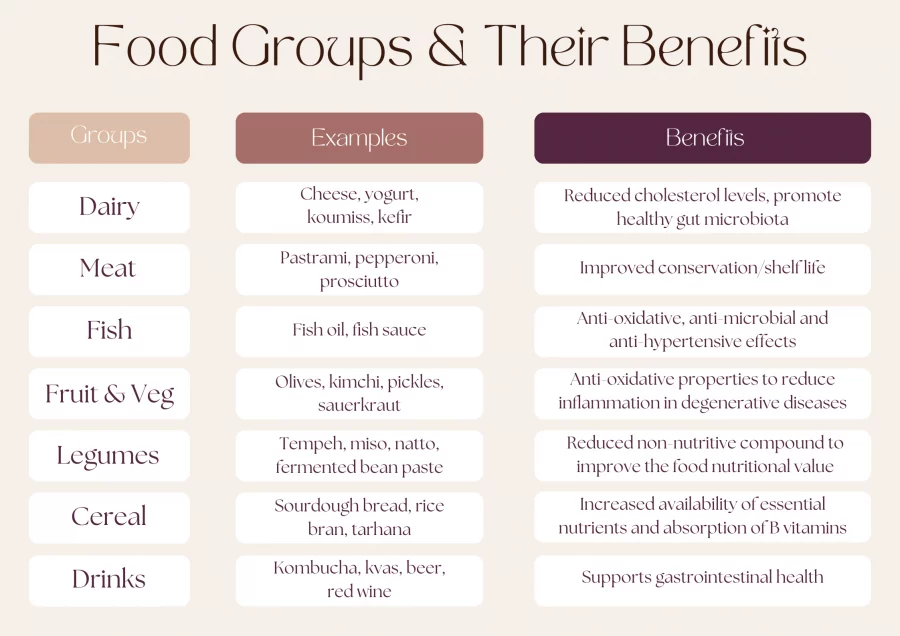Fermented foods have taken the culinary world by storm, captivating our taste buds with their interesting flavours and textures. But beyond their delicious appeal, these foods harbour a host of health benefits.
In this article, we’ll delve into the fascinating world of fermented foods, exploring their production process, nutritional transformations, and the remarkable advantages they offer for both the general population and athletes alike.
THE FERMENTATION PROCESS
Fermentation is a traditional technique for preserving food. During the process, microorganisms diligently break down carbohydrates into end products such as carbon dioxide, alcohol, or organic acids. They also generate probiotics—live microorganisms that contribute to a harmonious gut environment and provide a myriad of health benefits. Moreover, fermentation unlocks the potential of the food by releasing bioactive compounds like vitamins, enzymes, and antioxidants, thereby enhancing its nutritional value.
HEALTH BENEFITS OF FERMENTED FOODS
Now that we’ve explored the curious world of fermented foods, let’s uncover the scientifically-proven benefits they offer. Fermented foods are packed with probiotics to support and maintain a healthy and robust gut environment. These beneficial bacteria aid digestion, improve nutrient absorption, and strengthen the gut barrier. Research consistently highlights the positive effects of probiotics on digestive health, although individual responses may vary.
Fermentation also enhances the bioavailability of essential nutrients in food. For instance, fermented dairy products like yoghurt and kefir feature increased levels of B vitamins, calcium, and amino acids. This can be particularly advantageous for those with lactose intolerance. However, it’s important to note that nutrient enhancements can vary across fermented foods and methods.
The powers of fermented foods extend beyond your gut. Emerging research suggests that they play a pivotal role in mental health. Consuming fermented foods has been associated with improved mood, reduced anxiety and depression symptoms, and better cognitive function. Although the mechanisms are still being investigated, it is believed that probiotics and bioactive compounds from fermentation influence neurotransmitter production, reduce inflammation, and impact neural signalling pathways.
And let’s not forget their immune-boosting benefits. Probiotics found in fermented foods strengthen your immune system by stimulating immune cell production, enhancing gut barrier function, and reducing inflammation. Regular consumption of fermented foods may help reduce the risk of common infections and support immune function. Nevertheless, individual responses and optimal strains and doses require further research.
FERMENTED FOODS FOR ATHLETES
For athletes and fitness enthusiasts, incorporating fermented foods into their diet can provide additional benefits. When you push your body through intense exercise, inflammation becomes a common challenge. But fear not! Fermented foods, rich in antioxidants, come to the rescue. By reducing oxidative stress and aiding tissue repair, they accelerate your recovery and get you back in the game faster.
And let’s not forget about electrolyte balance. When you sweat, essential electrolytes like potassium, magnesium, and sodium are lost. Fermented drinks like kefir and kombucha provide a delicious and natural way to replenish those electrolytes. By restoring this delicate balance, you optimize your performance and pave the way for a swift recovery.
Finally, protein is an essential part of an athlete’s diet to grow and repair muscles. With fermented foods, you can expand your protein sources beyond the traditional options. Tempeh and fermented beans offer a plant-based, protein-rich alternative to fuel your body. Just remember to introduce them gradually to avoid any digestive discomfort.
For Health and performance benefits, fermented foods have you covered
Fermented foods have emerged as delightful allies on our journey to better health. Whether you’re an athlete striving for peak performance or a health-conscious individual seeking overall well-being, incorporating fermented foods like kefir, yoghurt, miso, and tempeh into your diet can be a smart move.
Tristan Boetti is a sports nutritionist. Through his company Performance & Bien-Être Monaco, he works with professional athletes as well as recreationally active individuals to help them achieve their goals through customised nutrition plans and expert advice.
SEE ALSO:
Photo source: The Matter of Food for Unsplash

